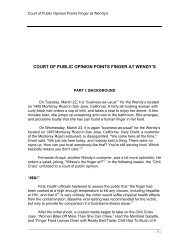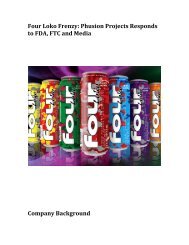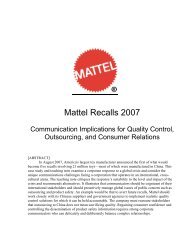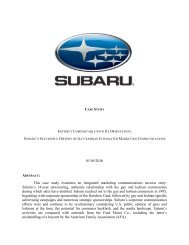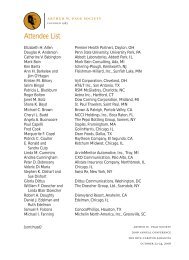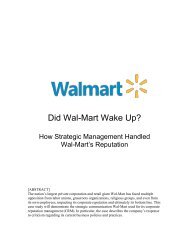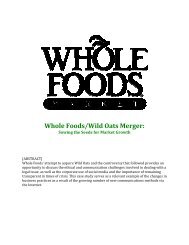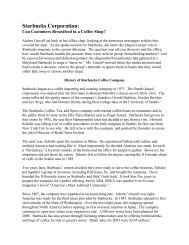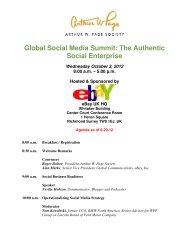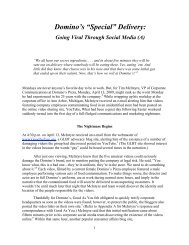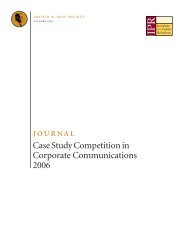McDonald - The Arthur Page Society
McDonald - The Arthur Page Society
McDonald - The Arthur Page Society
You also want an ePaper? Increase the reach of your titles
YUMPU automatically turns print PDFs into web optimized ePapers that Google loves.
For 40 years the world's appetite for Big Macs has been insatiable. Still the <strong>McDonald</strong>'s<br />
formula rolls relentlessly on into more and more markets, with 2,600 new stores expected<br />
to open this year (three-quarters of them outside the US) and more than 100 countries<br />
already blessed with the Golden Arches.<br />
But in the US, signs of desperation, some might say panic, are setting in. <strong>The</strong> world's<br />
biggest restaurant chain continues to grow, but only through aggressive expansion. Likefor-like<br />
store sales, the barometer of a fast-food chain's underlying health, were down<br />
between four and six per cent in May, according to US analysts.<br />
Marketing strategies keep going as soggy as an old cheeseburger. New products have<br />
repeatedly flopped; the last major pricing strategy - launched on April 25 and designed to<br />
run well into 1998 - has all but foundered in a the most humiliating of circumstances.<br />
Mitchell Speiser, analyst at Lehman Brothers in New York, says: "In the US its business<br />
is weak. <strong>McDonald</strong>'s has not put together an effective message. Its strategic direction is<br />
unclear."<br />
<strong>The</strong> corporation's overreaction to a couple of penniless environmental activists handing<br />
out libellous leaflets in the UK is perhaps symptomatic of a company so insular and so<br />
rigid it has lost its perspective.<br />
Everywhere else in the world <strong>McDonald</strong>'s continues to grow. International expansion is<br />
good for the bottom line because international sales are more profitable than sales in the<br />
domestic market. Competition is much less intense outside the US, so <strong>McDonald</strong>'s gets<br />
more people flocking to its stores and can charge higher prices.<br />
<strong>The</strong> power of the brand sweeps everything before it. <strong>The</strong> arches are a potent symbol of<br />
democracy and freedom of choice, as witnessed so poignantly in Moscow when<br />
<strong>McDonald</strong>'s opened its first restaurant and citizens queued for hours to buy the luxury of<br />
a burger and fries.<br />
But in the US, where that symbolism is largely meaningless, selling cheap burgers fast is<br />
not enough to keep attracting new customers. <strong>The</strong>re is unprecedented domestic<br />
competition for "share of mouth", from big rivals Burger King and Wendy's and new<br />
chains of quick-service restaurants offering everything from tacos to pizza to sushi.<br />
<strong>McDonald</strong>'s wins the war of convenience hands down, with 12,000 US restaurants<br />
compared with its nearest rival Burger King with 7,000, but some observers argue the<br />
corporation has become a victim of its own success.<br />
As <strong>McDonald</strong>'s opens more units in this saturated market, so it cannibalises existing<br />
restaurant sales and squeezes franchisees' profits.<br />
According to research from Technomic, a Chicago-based restaurant consultancy firm, the<br />
number of <strong>McDonald</strong>'s units grew in 1996 by 6.4 per cent but sales increased by only 2.9<br />
52



